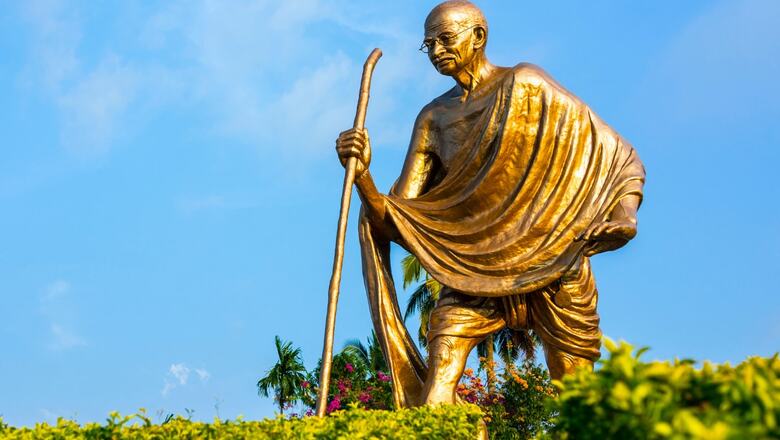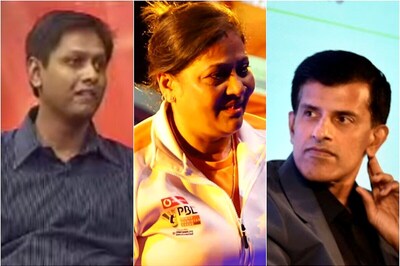
views
Every ordinary individual possesses the capacity to achieve remarkable feats, provided they discover how to tap into their inherent potential and let their creative energy flow freely. Few individuals symbolise this fundamental truth about human excellence better than Mahatma Gandhi, also known as ‘Bapu’ or the ‘Father of the Nation’ in India, born as Mohandas Karamchand Gandhi.
Bapu’s autobiography, The Story of My Experiments With Truth, is a blend of simplicity and boldness that puts into perspective how a young man excelled in life and became one of the greatest political and spiritual leaders the world had ever seen and will ever see.
In childhood, Mohandas was much like any of us, engaging in typical pursuits of a boy. However, what set him apart from most of his peers was the spirit of experimentation that began to germinate during his teenage years.
His autobiography indicates this. “My own recollection is that I had not any high regard for my ability. I used to be astonished whenever I won prizes and scholarships. But I very jealously guarded my character. The least little blemish drew tears from my eyes. When I merited, or seemed to the teacher to merit, a rebuke, it was unbearable for me. I remember having once received corporal punishment. I did not so much mind the punishment as the fact that it was considered my desert. I wept piteously. That was when I was in the first or second standard.”
That nature to guard his character slowly started transforming the schoolboy. He aspired to be a caring and disciplined student and son. When in Class 7, he was once accused of lying when he missed the gymnastics training session. He had no watch, and as it was a cloudy day, he miscalculated the time and reached the training session late when all others had left, and he was thus marked absent.
“I was convicted of lying! That deeply pained me. How was I to prove my innocence? There was no way. I cried in deep anguish. I saw that a man of truth must also be a man of care. This was the first and last instance of my carelessness in school.”
He was married when he was 13 and left for England when he was 18 to study law. His time in England and South Africa served as successive testing grounds where he explored the impact of his thoughts, education, and upbringing on his personal identity. As mentioned earlier, he was acutely aware of his own persona, a self-awareness, and a time away from home, in a different country that ruled us and a professional education, ultimately gave birth to a formidable ideology rooted in non-violence in the years ahead that would go on to challenge the British Empire, first in South Africa and then in India.
Like any human being, he was not immune to mistakes or occasional lapses in judgment. Yet, his intentions remained beyond reproach and should forever remain unquestionable. Remarkably, even his staunchest adversaries found him endearing on a personal level.
Gandhi acknowledged his mistakes, often in a straightforward manner. He might have made errors as many critics suggest, but his positive contributions, progressive ideology, and innovative methods to achieve his goals overshadowed any negatives on his record and surpassed the achievements of many others. As the saying goes, to prove a point, you must draw a line larger than the existing one, and Gandhi did so with remarkable finesse.
He aligned his goals with those of ordinary Indians. He truly became one of them, striving to embody their essence and succeeding in becoming the embodiment of their thoughts.
From being a Gandhi from Porbandar, his acts of being an altruist and caring one for all the needy in society gradually transformed him into the Mahatma of the masses. Propagation of non-violence to achieve freedom from the colonial rule – no one before the Mahatma had ever spoken about it – and its success in South Africa made him the political leader the colonial India was waiting for. What India of the day got was a spiritually visionary as well. Bapu seemed to be following Gautam Buddha in his thoughts and living.
Satyagraha was the core of his non-violent political ideology. It means ‘holding onto truth’. Hunger strikes or observing fasts as a tool to achieve goals on the path of Indian freedom was a symbol of his commitment to ordinary Indians and to the country. Sacrificing your life and its energy to force others to think positively to help and free the common man, no other political leader in the world has done so before Bapu. It gradually converted the young lawyer turned freedom fighter into Mahatma.
Bapu’s 1918 fast was for common, poor Indians. Bapu observed four days of fasting in support of poor workers of textile mills in Ahmedabad. Workers were demanding a 35% wage hike, but owners were not ready to go beyond 20% and declared a lockout. After some workers returned to work accepting a 20% raise, Bapu decided to go on fasting until the 35% raise demand was accepted. It encouraged not only the protesting workers but also those who had broken ranks; they returned too. The mill owners then had no option but to accept the 35% wage hike demand.
Since then, until 1948, Bapu observed around 16 fasts in India, with four fasts unto death. In 1947 and 1948, when India got independence and Pakistan was carved out of its geographical territory resulting in widespread religious violence, Bapu observed fasts unto death for communal harmony. Rabindranath Tagore called him Mahatma for the first time in 1915.
Bapu’s philosophy, the Gandhian way of life, has not only deeply influenced India but has also left an indelible mark on many parts of the world. Rarely in history has a single individual’s philosophy become such a significant force in socio-political thinking. In the annals of contemporary world history, he stands unmatched, alongside the revered spiritual sage Swami Vivekananda, another experimental soul who became a beacon of thought.




















Comments
0 comment